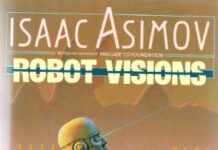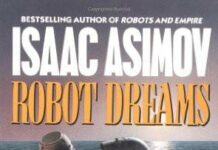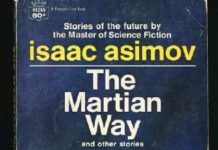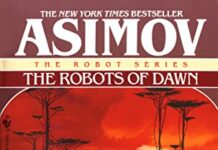
Ebook Info
- Published: 2012
- Number of pages: 398 pages
- Format: EPUB
- File Size: 0.38 MB
- Authors: Isaac Asimov
Description
The fourth novel in Isaac Asimov’s classic science-fiction masterpiece, the Foundation seriesTHE EPIC SAGA THAT INSPIRED THE APPLE TV+ SERIES FOUNDATIONAt last, the costly and bitter war between the two Foundations has come to an end. The scientists of the First Foundation have proved victorious, and now they return to Hari Seldon’s long established plan to build a new Empire on the ruins of the old. But rumors persist that the Second Foundation is not destroyed after all—and that its still-defiant survivors are preparing their revenge. Now two exiled citizens of the Foundation—a renegade Councilman and a doddering historian—set out in search of the mythical planet Earth . . . and proof that the Second Foundation still exists.Meanwhile someone—or something—outside of both Foundations seems to be orchestrating events to suit its own ominous purpose. Soon representatives of both the First and Second Foundations will find themselves racing toward a mysterious world called Gaia and a final, shocking destiny at the very end of the universe.
User’s Reviews
Reviews from Amazon users which were colected at the time this book was published on the website:
⭐It makes me think a lot about all possible solutions, all complexity about the characters and their future. It has a nice plot.
⭐I am a voracious reader. I fell in love with Asimov’s writing as a teen in the 70s. Foundations Edge is my favorite book of the series. I always have remembered I/We/Gaia…. A utopian view of a possible future. Great read.
⭐This installment of the series is very enthralling and keeps you reading to see what is going to happen next.
⭐Warning: Spoiler Alert!It is 500 years after the establishment of the Foundation on the isolated planet of Terminus. The young and brash councilman, Golan Trevize, has been drawing the irritated attention of the Mayor of Terminus for his overt actions regarding his negative opinions of Hari Seldon’s “Plan”, and the existence of the Second Foundation. And this gets him exiled, along with a 52 year-old scholar of history and mythology, Janov Pelorat.Yet, it is a very strange exile. He is given a powerful computer-controlled spaceship with the ability to jump through hyperspace with ease, and a “mission” to search for “Earth”, the legendary planet of human origin. Meanwhile, Stor Gendibal, a brilliant and powerful speaker of the Second Foundation, still located on the planet Trantor, prior center of the Galactic Empire, proves to the First Speaker, that a group with mentalic powers greater than their own, are keeping the Seldon Plan on track with far greater accuracy than the Second Foundation could. He further points out that it is Golan Trevize, the councilman of the Foundation Federation, who is the inadvertent pawn of this “anti-mule” group.And so begins the incredible odyssey of Golan and Janov, as they bond together on their quest through the Galaxy to find Earth, but unknowingly to unravel a mystery which holds the fate of the entire Galaxy in their hands.There are a multitude of science fiction stories which describe starships speeding across the Galaxy, flitting from star to star or planet to planet, but most of them pay little attention to the details of what that interstellar travel must involve. Asimov, via the delightful and thoughtful conversations of his two protaganists of Golan and Janov, provide the readers with a truly appealing interchange between the two men as they become fast friends in the depths of space. And in that interchange, we are treated to the beautifully explained and articulated thoughts and trade secrets of space travel and mythology – and the “rules” of how to behave on a strange planet – of a time 20,000 years in the future.Asimov leaves us well entertained with his soul-satisfying climax, as the three “powers” in the Galaxy – the Foundation, the Second Foundation, and the “anti-mules” of the mysterious planet “Gaia” – meet in stalemate in space to let Golan Trevize decide the future fate of the Galaxy.
⭐3.25/5I’m torn on how to rate this book. It isn’t like the first three in writing (not least in losing the header references to the Encyclopedia Galactica), which are very terse (Foundation having been serialized) in the fashion of mid-century sci-fi: this is more like modern science fiction, with more of a focus on characters and so on instead of plot, technology, and twist.The first two novels are relatively harder science fiction. Second Foundation, with the introduction of mentalics, veers to the soft. I enjoy Seveneves as much as Star Trek, but the change in tone is jarring. This book continues the shift begun in Second Foundation.It’s well-written and gripping for the first two-thirds, but I found the conclusion entirely unsatisfactory. It has something of the Deus ex about it, even though it is nigh as thoroughly hinted as Chekhov’s gun.I have been rooting for the Second Foundation for the entire series, ever since I learned it existed. It fits my bookish and mathematical temperament. In the end of this book, the future under the Second Foundation is described as a ‘future from calculation, ruled by calculation, a living death’. It sounds like my kind of future. Even the first Foundation, with its machiavellianism, is tolerable: it is just realpolitik. It is described as ‘a rebirth of the first Galactic Empire, born in strife and dying in strife’: but it is the first Empire born again.Instead we are introduced to Gaia, the Mule’s home planet, inhabited by a race of Mules comprising a hive mind – including the natural environment, in a sort of Earth/Animal Liberation Front dream – ruled by the hidden hand of remnant robots left over from the first colonization of the galaxy. I can see why the Mule tried so hard to escape it and its influence after a few pages of description, and almost sympathize with his actions now. (By the way, the description of Gaia in this book doesn’t fit at all with what the Mule himself tells about his history, so either the Mule was lying or Gaia is: I think it is likely the latter, Gaia is so creepy.)It gives me strong hints of being a sort of Rousseauvian ‘natural’ ‘paradise’ where ‘if it feels good, do it’ and ‘anything goes’ and there’s no real logic or reason not provided by the robot overlords, but merely a ‘good vibing’ with everything and anything (aka Hell) – a reflection of our degenerate ethics of late modernity, the inversion of high and low culture, body and social body – as opposed to the appealing ascetic, scholarly self-control of Second Foundationers and their ethic.I digress: in the climax, Gaia and both Foundations are brought to a three-way Mexican standoff, and Trevize (one of the main characters) is, through a bit of Deus ex magic, forced to choose between the three alternate visions for the future: the First Foundation’s realpolitik, high technology, and militarism, the Second Foundation’s monastic, ascetic scholarship and hidden-hand paternalism, and extending the hive mind of Gaia’s ‘good vibes’ throughout the galaxy to form ‘Galaxia’. The decision is entirely predictable as soon as the standoff commences, robbing it of drama and narrative force.Trevize chooses Gaia and Galaxia, both concepts of which are emotionally repulsive to me, especially as contrasted with the adamantine beauty of the Second Foundation. If you are not innately repulsed by the Gaian good-vibes, uninhibited, state-of-nature ‘paradise’, you’ll probably find the ending – and the book – much more to your liking. I’m of the hard Right with libertarian tendencies (like Hans-Hermann Hoppe, but further Right), and Gaianism seems to be the culmination of the collectivist Left’s ideals – both the old Marxist Left and the post-70s postmaterial New Left’s combined. I’m also very religious, but the scientific materialism of the first trilogy didn’t put me off at all, so I don’t think it plays a role in my rating here.This choice of the Gaian vision for the future is why the ending is crushingly unsatisfying to me. They’re not antiheroes, or evil-is-a-matter-of-perspective types: they are definitely Asimov’s good guys, but I find their vision, vibing, and robot paternalism repulsive. I don’t often have emotional reactions to fiction books, but boy, did I to this one’s conclusion.The two Foundations’ memories of Gaia are wiped, and the First Foundation’s suspicions of the survival of the Second are allayed. Both Foundations believe they’ve won a victory.However, Trevize finds out that Gaia (or some other actor) is hiding the existence of Earth – the origin planet – from him, and reveals that he chose the Gaian vision because he was ‘temporizing’ and believed it could be reversed (though he says he doesn’t think it likely he made the wrong decision), whereas the other options would immediately have given either the First or Second Foundations complete hegemony. It is only in this hope that the Gaia/Galaxia plan comes to naught that I read the next book in the series.I hope it comes to naught to redeem the series, for as-is, it has been like listening to a Wagner opera with a hideous screech at the end of the record, which taints the enjoyment of what came before.
⭐The galaxy is so full of humans that it’s lost it’s charm. The story has always been about people and politics, but this book really started to struggle.
⭐Well written, as you’d expect, but the plot was quite weak and the ending I thought was hugely disappointing. Just not in the same league as the original trilogy. I bought Foundation and Earth at the same time as buying this, but I’m in no rush to read that now. Maybe Asimov should have stopped with the trilogy.
⭐The language is a bit quaint – the academic in here talks like he’s out the 1950s -“old chap, I say”. Surely even when Asimov wrote the story this kind of speaking had gone from university? I may have been bemused when I first read this but nearly 40 years on it’s daft. Still it’s quite a good read
⭐The most completely absorbing book I have ever read – even after 3 readings.If you are familiar with and like the foundation series this book will not disappoint.Azimov has the courage to break with the formula here and the story branches out into wholly new territory.The content, context and dialog are very convincing and the delivery is Azimov at his most human, and best.He has the ability to put over very complex and serious ideas in a totally straighforward way and never indulges intechnical wizardry for its own sake, simply using technical ideas to explain the purpose of the plot.Very few SF books illustrate a possible milestone in social and polital psychology in such an entirely vivid and readable way.Better if you’ve read the foundation series beforehand but the essential background is given here and the book stands up perfectly well on its own. Any detailed description of the story would detract from the reading experience but get through the first chapter or two and you’ll find it hard to put down until it’s inspirational ending.
⭐It’s incredible how much better Asimov’s literary skills got with age. Much better written than the early books, though the plot is a bit wonky and the ending is meh. Well worth reading as part of the series!
⭐Probably my favourite of the series so far. So many ideas, great characters and you have to keep remembering how many years ago this was written. He really is the Master
Keywords
Free Download Foundation’s Edge in EPUB format
Foundation’s Edge EPUB Free Download
Download Foundation’s Edge 2012 EPUB Free
Foundation’s Edge 2012 EPUB Free Download
Download Foundation’s Edge EPUB
Free Download Ebook Foundation’s Edge





